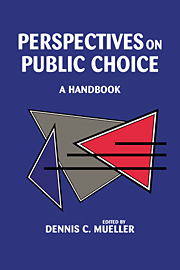Book contents
- Frontmatter
- Contents
- Preface
- Contributors
- 1 Public choice in perspective
- Part I The need for and forms of cooperation
- Part II Voting rules and preference aggregation
- Part III Electoral politics
- Part IV Individual behavior and collective action
- 17 When is it rational to vote?
- 18 Voting behavior
- 19 Public choice experiments
- Part V Public choice in action
- References
- Name index
- Subject index
17 - When is it rational to vote?
Published online by Cambridge University Press: 04 May 2010
- Frontmatter
- Contents
- Preface
- Contributors
- 1 Public choice in perspective
- Part I The need for and forms of cooperation
- Part II Voting rules and preference aggregation
- Part III Electoral politics
- Part IV Individual behavior and collective action
- 17 When is it rational to vote?
- 18 Voting behavior
- 19 Public choice experiments
- Part V Public choice in action
- References
- Name index
- Subject index
Summary
As for popular suffrage, it may be further remarked that especially in large states, it leads inevitably to electoral indifference, since the casting of a single vote is of no significance where there is a multitude of electors.
Hegel (1984, 202–3)I'll understand why people vote when I understand why someone, alone in his room, salutes during the national anthem.
Paraphrase of a comment by Gerald Kramer, overheard by author at a conferenceThe rationality of voting is the Achilles' heel of rational choice theory in political science. Public choice theorists themselves divide over the question of whether turnout can be considered a rational decision. As my paraphrase of Gerald Kramer's comment illustrates, some of the very best theorists think it unlikely, to say the least, though many others have sought for some satisfactory means to conclude the opposite (e.g., Downs 1957; Riker and Ordeshook 1968; McKelvey and Ordeshook 1972; Ferejohn and Fiorina 1974). The stakes are high. Voting is perhaps the most common and the most important action considered by citizens in a democracy. If such a common and important decision faced by ordinary people cannot be understood as “rational,” then how can our complex theories of politics, public choice, and even economics stand, if based on such infirm ground? As arcane and complicated as public choice accounts of voting can be, the fundamental problem is really quite simple. Hegel, not often considered a major contributor to public choice theory, put the problem clearly.
- Type
- Chapter
- Information
- Perspectives on Public ChoiceA Handbook, pp. 373 - 390Publisher: Cambridge University PressPrint publication year: 1996
- 23
- Cited by



